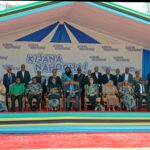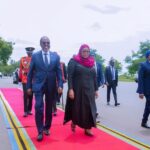Minister of Natural Resources and Tourism, Hon. Angellah Kairuki, Inaugurates Tanzania’s First Honey Show: A Call to Embrace Beekeeping for Economic Growth
In a significant event for Tanzania’s agricultural sector, the Minister of Natural Resources and Tourism, Hon. Angellah Kairuki (Mb), officially inaugurated the country’s inaugural Honey Show. This significant occasion marks a pivotal moment in the promotion of beekeeping and honey production as viable avenues for economic empowerment and sustainable development.
The Honey Show, held in the Tanzanian capital of Dar es Salaam, attracted a diverse range of participants, including local beekeepers, honey producers, agricultural experts, and enthusiasts from various regions of Tanzania. The event aimed to demonstrate the significant potential of the beekeeping industry, emphasising its benefits not only for individual livelihoods but also for the broader national economy.
A Vision for Economic Empowerment
In her opening remarks, Hon. Angellah Kairuki underscored the transformative potential of beekeeping and honey production. She encouraged Tanzanians to capitalise on the opportunities presented by this rapidly developing industry, with the aim of increasing their income and improving their quality of life.
“Beekeeping is not just a hobby; it is a viable economic activity that can significantly contribute to poverty alleviation and rural development,” Hon. Kairuki stated. “By embracing beekeeping, we can create jobs, increase household incomes, and promote sustainable agricultural practices.”
The Economic Potential of Beekeeping
The practice of beekeeping, or apiculture, has long been acknowledged for its numerous economic and environmental benefits. Honey, beeswax, propolis, royal jelly, and other bee products are highly valued in both local and international markets. Tanzania, with its diverse flora and favourable climate, is in a unique position to become a leading producer of high-quality honey and other bee products.
The global demand for honey and bee-related products has been consistently rising, driven by an increasing awareness among consumers of the health benefits associated with these products and the growing popularity of natural and organic products. By capitalising on this lucrative market, Tanzanian beekeepers can significantly enhance their incomes and contribute to the country’s economic growth.
Sustainable Agriculture and Environmental Conservation
In addition to the economic benefits that beekeeping offers, it also plays a crucial role in the promotion of sustainable agriculture and environmental conservation. Bees are essential pollinators, contributing to the health and productivity of various crops. By supporting beekeeping, Tanzania can enhance its agricultural output and ensure food security for its population.
Moreover, beekeeping is an environmentally friendly activity that requires minimal land and resources. It can be integrated into existing farming systems, thereby providing an additional source of income for farmers without competing for land or water resources. This makes beekeeping an optimal livelihood option for rural communities, particularly in areas where agricultural opportunities are scarce.
Empowering Women and Youth
One of the most significant aspects of the Honey Show was the focus on the empowerment of women and youth through beekeeping. The Hon. Kairuki emphasised the significance of inclusive economic development, highlighting that beekeeping presents distinctive prospects for women and young people to become entrepreneurs and contribute to their communities.
“Women and youth are the backbone of our society, and their active participation in beekeeping can drive positive change and foster economic resilience,” Hon. Kairuki remarked. “We must provide them with the necessary training, resources, and support to succeed in this industry.”
The event showcased a number of initiatives and programmes designed to equip women and youth with the requisite skills and knowledge to excel in beekeeping. These included training workshops, mentorship programmes, and access to microfinance services, which were designed to assist aspiring beekeepers in starting and expanding their businesses.
Government Support and Policy Framework
The Tanzanian government has demonstrated its commitment to supporting the beekeeping industry through the implementation of various policies and initiatives. Hon. Kairuki emphasised the government’s endeavours to create an enabling environment for beekeepers, including the development of a comprehensive national beekeeping policy and the establishment of beekeeping cooperatives.
“We are committed to providing the necessary infrastructure, research, and extension services to support the growth of the beekeeping industry,” Hon. Kairuki affirmed. “Our goal is to make Tanzania a leading producer and exporter of high-quality honey and bee products.”
Furthermore, the government has been engaged in close collaboration with international partners and organisations with the objective of disseminating best practices in beekeeping and enhancing the competitiveness of Tanzanian honey in global markets. The collaborative efforts have been directed towards the improvement of honey quality, the assurance of compliance with international standards, and the investigation of new market opportunities.
Success Stories and Innovations
The Honey Show provided a forum for beekeepers and honey producers to disseminate their experiences and innovative practices. The event offered attendees the chance to gain insights from experienced beekeepers who have successfully transformed their beekeeping enterprises into profitable operations.
Tanzania Media
- Tanzanian Women’s Football Derby: Yanga Princess Stuns Simba Queens with 1-0 Victory - 25 March 2025
- Tanzania’s Parliamentary Debate 2025: Addressing Infrastructure, Water Access, and Environmental Challenges - 25 March 2025
- Tanzania’s Vision for Inclusive Growth: Insights from the Ministry of Community Development’s 2024/2025 Budget - 24 March 2025
































